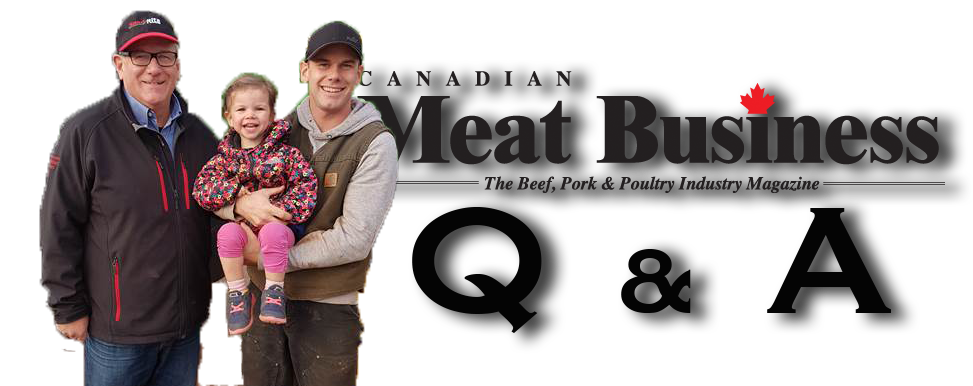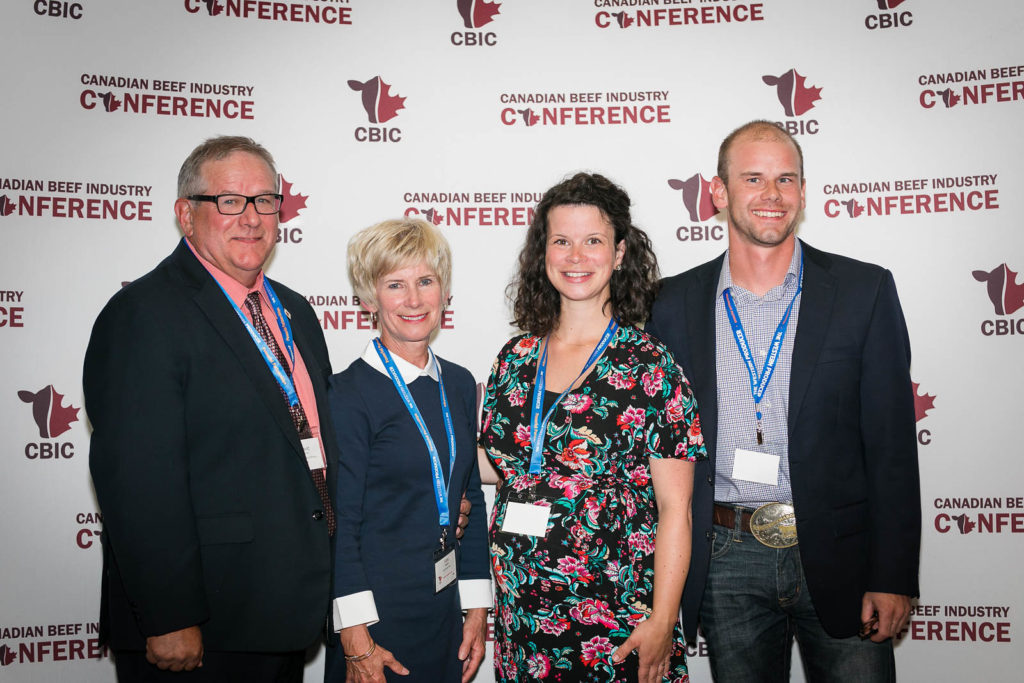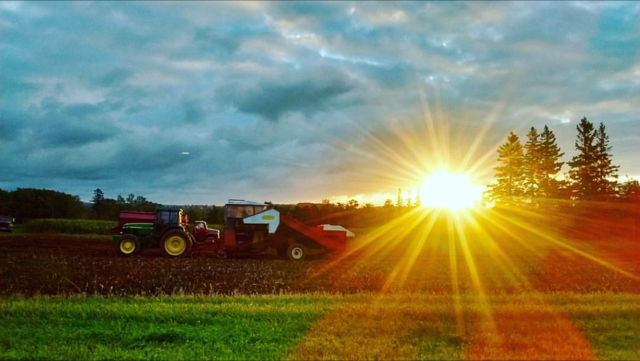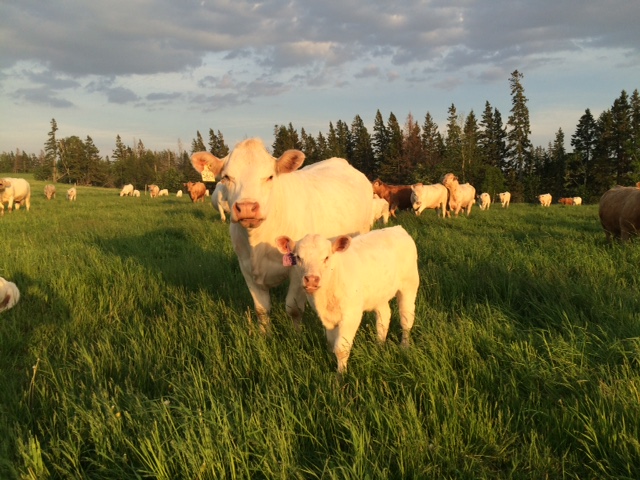David Francis Farms, PEI – 2017 TESA Recipient

David Francis will tell you no one was more surprised than he when the Canadian Cattlemen’s Association (CCA) selected their farm as recipient of this year’s TESA -The Environmental Stewardship Award – during the Canadian Beef Industry Conference (CIBC) this past August in Calgary
a Canadian Meat Business exclusive by Cam Patterson
He shared the award with his family, and notably his son Brett, a partner with his father running the farm, and is the seventh generation in a long line of farmers. Being recognized is something David Francis Farms is no stranger to this year. In February they received the Gilbert R. Clements Award for Excellence in Environmental Farm Planning from the PEI Federation of Agriculture.
David will tell you he certainly did not expect such recognition on a national level. He was honored their farm was chosen, he’s more proud of the recognition about all the press surrounding the award has brought to his home province along with the pro-active conservation and sustainability programs the island’s Agriculture sector is now being recognized for.
Canadian Meat Business (CMB) is pleased to bring you another in our on-going series of Q+As, this time with TESA recipient David Francis (DF).
“We are small players in the national beef industry and I think it was a real credit to their organization (CCA) to recognize us”
CMB: Can you tell us about your background in the industry?
DF: Well, I was born into it as I am now a sixth generation farmer. I farmed with my father as he farmed with his father and now my son Brett runs the farm with me. As a matter of fact, our home farm here dates back to 1844. A couple years ago the Federation of Agriculture had a program for confederation farms and we qualified among 72 other farms in the province.
CMB: Where on Prince Edward Island are you located?
DF: Actually we’re eight miles from Confederation Bridge, near Crapaud in the community of Lady Fane. We can see the bridge from our property. We love it out here, it’s a very beautiful province to live in.
CMB: How big is your operation?
DF: We’re a medium sized farm where Prince Edward Island is concerned. We grow seed potatoes for resale and have a potato chip contract with Lays Chips. We also do barley, mixed grain and corn as well as our Lady Fane Charolais brand, where we have 80 bred female Charolais cattle, four bulls, and calves. All in all we’re quite diversified.
CMB: Has the family always done mixed farming?
DF: Yes, we’ve always maintained our livestock operations right along with our crops. But we’ve always had feeders, typically getting them up to around 850 lbs then sell them to two feedlots here on the island. We do sell breeding stock as well.
CMB: Long before the TESA award this year, you had been noted as one of the first farms on PEI for your sustainable practices and soil conservation work. How did that begin for you?
DF: In 1991 we put in a fairly large conservation project on one of our 125 acre farms. We completely changed the whole landscape of that property and divided it into 12 strips with terraces and berms and waterways, cropping them on a three year rotation. Since then, we’ve been doing some type of soil conservation work every year.
CMB: That must have been a big undertaking. What exactly prompted you to change your farming method and adopt that?
DF: On Prince Edward Island we have very light sandy soil and very prone to wind and water erosion. Many farmers here are always looking for ways to reduce soil degradation. As a result, our soil section with the department of agriculture was just getting into designing those conservation layouts back in 1991, and so it was with the cooperation of the department of Agriculture that I got involved. So we did some surveying and figured out how we could farm the same number of acres on the same rotation. It did reduce the length of the crop row and we did farm across some of the slope to reduce the erosion as well.
CMB: How has that translated to your livestock management?
DF: After the initial project, we got involved with environmental farm plan and reviewed all the operations on our farm, with the goal as to how we can be more environmentally sustainable while maintaining a good level of production. And that included our livestock operation. So we fenced all our cattle out of the brooks on our farm, duly fencing both sides. Then a few years ago we broke up our larger pastures into paddocks. We rotate our cows and calves in six different paddocks every 5-7 days, depending on grass regrowth. On our other pasture, where we keep our bred heifers, we divided it into three paddocks, installing water bowls on 20’ x 25’ cement pad so no seepage gets into the brooks and water ways. The livestock drinking water is pumped from a well, which of itself was quite an undertaking, but well worth the effort.
CMB: Did this method of management come from the Alternative Land Use Services (ALUS) program?
DF: When we did most of our soil conservation work, ALUS was not in existence. But since they implemented the program in 2008, we have been enrolled. It’s a wonderful program to be honest and we’re lucky to have a provincial government that puts money into conservation in this way. Matter of fact I believe PEI is the only province in the country where the ALUS program is offered to all.
CMB: That’s interesting. Why do you think that is?
DF: I think the fact we’re a small province made it a little easier for a program like ALUS to go province wide with a very high level of participation.
CMB: How does the ALUS program benefit you?
DF: We get an annual payment for all the land that we’ve taken out of use. For example our grassed headlands, grassed waterways, the slopes we’ve retired, or the land used to build the terraces. We also receive maintenance payments for fencing that is dedicated to the waterways and brooks.
CMB: Would you say there are some real pros and cons to farming on an island?
DF: I don’t think being on the island has really impacted us negatively one way or the other. We’ve traveled a lot, met a lot of other farmers and livestock producers in other parts of Canada, and we all seem to have the same issues and same concerns.
CMB: I understand that your farm was the first in Atlantic Canada to be involved in the TESA program.
DF: Yes, I think we were the first farm east of Ontario as far as I understand. I’m not sure why the eastern associations wouldn’t have previously nominated anybody because there are many farms here on PEI doing every bit as much as we are as to attain a high level of sustainability. Anyway, we were very surprised when the PEI Cattleman’s Association nominated our farm.
CMB: And then you were attending the Canadian Beef conference in Calgary and you won.
DF: Yeah! That was a very nice moment for us. But I don’t like to use the word win actually. However, being recognized for our commitment was a real honour. If you want to know the truth, it was a pretty humbling experience. As I said to CBC when they phoned me after the conference, I was just floored, really couldn’t believe it.
CMB: So now that you have been recognized, do you think that will draw more attention and garner more nominations out of Atlantic Canada going forward?
DF: Absolutely. We’ve gotten a lot of good press highlighting the island cattle industry. I’m positive you’ll see more farms in our neck of the woods nominated next year. And I have to give the Canadian Cattleman’s Association recognition for choosing a farm from Prince Edward Island. We are small players in the national beef industry and I think it was a real credit to their organization to recognize us. They treated all the nominees royally and it was a real class act. It was a wonderful experience.














